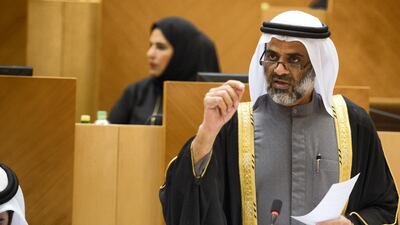A new government scheme that prioritises Emiratis over expats in private companies should have been introduced decades ago, said a member of the UAE General Assembly.
The Ministry of Emiratisation and Human Resources recently announced plans to activate Article 14 of the labour law, which states that a non-UAE national should be given approval for employment only when an unemployed national suitable for the position cannot be found.
Minister Nasser Al Hamli said 400 selected professions in 2,000 private establishments will now have to give priority to Emiratis when recruiting.
Hamad Al Rahoomi, a Dubai member of the Federal National Council, who has long called for Article 14 to be enforced, said if this move took place back in 1980, “we would not have reached the struggle we have reached today where we are begging companies to recruit nationals.”
“Without this article we cannot achieve Emiratisation. I used to be the head of the Emiratisation committee and we did not succeed.”
He said he was happy that the government is now taking proactive steps, starting by adding Emiratisation in the Ministry’s title. He said: “We don’t only need a labour ministry, but one that also makes sure no Emirati will look for a job and not find one.”
The initiative is quite doable, he said, because the government is not targeting small or medium companies who might not be able to afford Emirati salaries, “we are talking about large establishments, and we know how much they pay expats. They can afford to amend the salary to fit a UAE national.”
The companies, in his opinion, will also be saving money by recruiting nationals.
“They will get discounted fees from the Ministry. They will be saving on residency costs and airline tickets and on health insurance.
“And they are coming to the country to invest and make profit. They should consider this as part of their social responsibility to give something in return by creating job opportunities for nationals.”
Excuses that it is hard to find Emiratis qualified for some posts are invalid, he said, because all government departments and some major private companies are run by Emiratis and they have proved their excellence by competing at an international level.
Minister Al Hamli, said they will be taking procedures against companies who recruit Emiratis on the surface only to fill the quotas.
"We don’t want companies to practice superficial Emiratisation where they hire someone just to fill a quota. This is unacceptable. We want the Emirati employee to be productive and fulfill their role,” he said.
“We are not stupid. We know they are doing this and we will sit with them and take our own procedures,” he said on Wednesday.
Rola Al Moheid, an HR consultant in Dubai, said picking certain companies to implement the scheme will place stress on those companies.
“If they are profitable and doing well money-wise, you don’t want to pressure them. If this will happen in the market, it should apply to everyone.”
“I would be more strict with government and semi-government entities before I go to the private sector.”
She said asking companies to justify why they would not recruit an Emirati candidate over an expat places responsibility on the company alone, while the candidate should also share the responsibility.
In Saudi Arabia, for example, nationals who fail to find a job have to prove that it was not due a lack of effort from their side. The government also stopped issuing salaries for unemployed nationals unless it is proven that they have taken all measures to find a job.
____________
Read more:
Companies to prioritise Emiratis over expats in new nationwide drive
Minister told of frustration at Emirati unemployment levels
Unemployment among young Emiratis rises to 8 per cent in Abu Dhabi
____________
“When resources become limited, this creates a sense of responsibility to work harder.”
She suggested similar responsibilities should be placed on UAE nationals, so when they are offered a job they will take it seriously and avoid falling into superficial Emiratisation.
Minister Al Hamli said previously if a company sees the Emirati as unfit for a position, they should justify why and the ministry will take the role of training and qualifying them.


